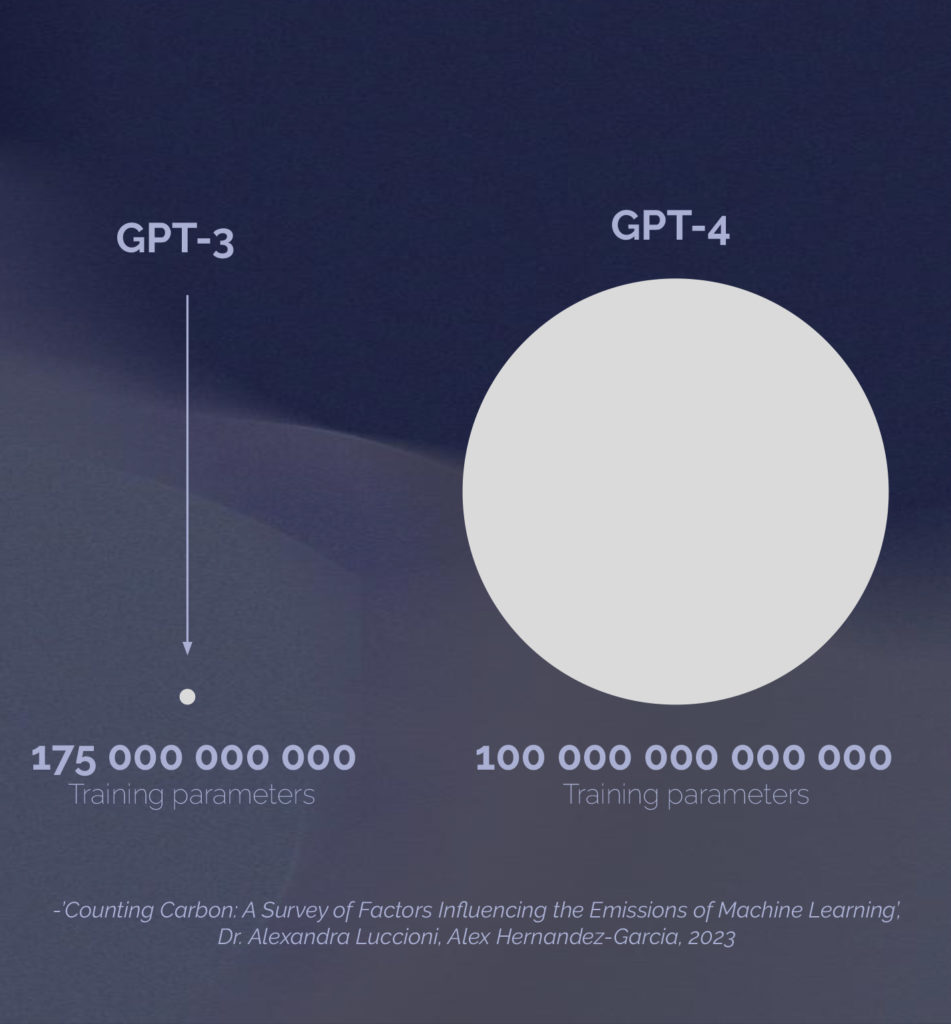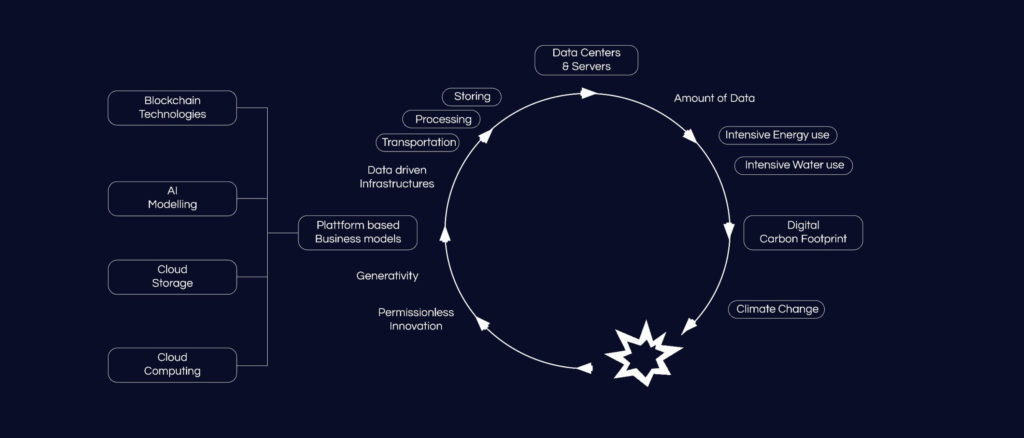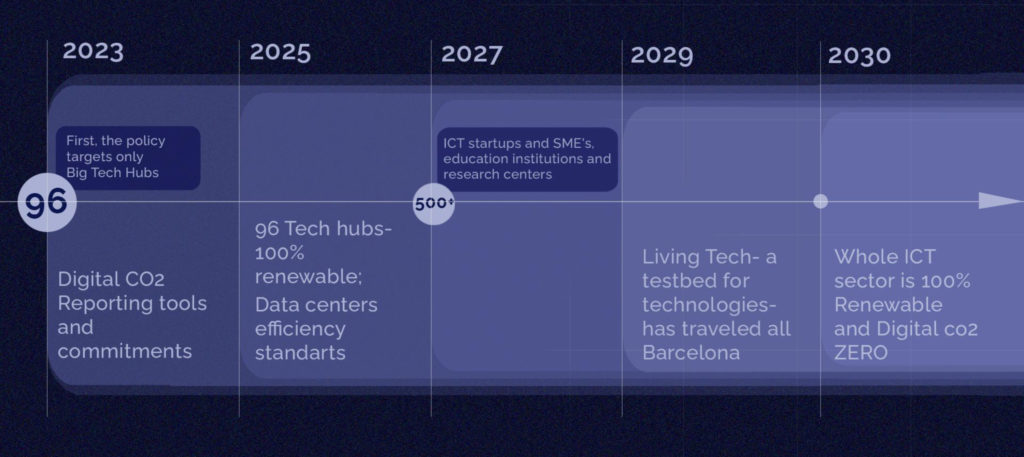The rising problem of Digital Energy consumption
Recent estimates put the contribution of the information and communications Technology, the (ICT) sector – which includes the data centers, devices and networks used for at around 4 % of global Greenhouse gas emissions. A trend that is unlikely to stop, as the amount of data produced and consumed are increasing.
Recently, some of the excitement over AI’s recent progress has shifted to alarm. In a study last year, researchers at the University of Massachusetts at Amherst estimated that training a large deep-learning model produces 283,95 tones of CO2 equal to the lifetime emissions of 5 cars. Having a look at An article in “Nature” in 2018, that has analyzed the distribution of energy consumption by “data flows” indicated a drastic increase of energy demand in near future, which coincides with the estimation of a 500% increase of Data Centers in Spain, especially in Barcelona by 2030. These data generation models require vast amounts of energy generation, which currently is not under the scope of any policies in the world.

Big Tech hubs and data-driven business models- emerging contributors to the climate change
Data and information flows is a phenomena that is hard to measure, leaving questions such as who’s responsible and accountable for the consequences of the digitalization unaswered. But what we do know is that the amount, pace and speed of platform based business models of Artificial intelligence, Blockchain technologies is increasing significantly. It is acknowledged that these data driven business models rely on a complex chain of processes- once generated in a device, the information needs to be transported, processed and stored in data centers, which requires enormous amounts of energy and water use, producing digital carbon footprint, which eventually creates digital sector as one of the emerging climate change contributors. In Europe, the scene of digital infrastructure is occupied by 5 big Cloud Tech companies, such as Amazon- they own about 55% of the field as indicated in recent Mobile World Congress.

Barcelona- a front- runner of ICT and data center market in Europe
This project puts focus on one city in specific- Barcelona- that positions itself not only as the ICT front-runner, but also as an emerging leader in the data center market in Europe, expecting to grow by 500% in the next 5 years (-CBRE). It is also in the global spotlight. Medusa Submarine Cable System, an underwater cable for data transfer, acts as a new corridor from Asia to the Atlantic through Barcelona, enabling regional development of the ICT (-The New Barcelona Post). All of these factors highlight the importance of Barcelona taking action to promote digital CO2 accountability on a global scale.

Lack of research and policy addressing digital carbon footprint
Through our research, we have identified a critical gap in knowledge and data surrounding digital carbon footprint. Currently, there is no policy worldwide that tracks or measures this footprint. Looking at the European Union perspective, existing policies primarily focus on energy efficiency and the transition to renewable energy, mainly targeting large corporations. Spain also has a corporate reporting law that follows international sustainability reporting standards. However, both the international and local levels have critical gaps in addressing digital CO2 emissions.
Furthermore, there is currently a lack of scientific studies specifically covering digital carbon footprint. While studies do exist on certain aspects, such as the CO2 consumption of a single web search query ( ‘A Study on Query Energy Consumption in Web Search Engines’, Matteo Catena, Nicola Tonellotto) or the emissions and energy consumption of specific AI models (’Counting Carbon: A Survey of Factors Influencing the Emissions of Machine Learning’, Dr. Sasha Luccioni, Alex Hernandez-Garcia, 2023) there is a clear need for more comprehensive data and research in this area. Before any further implementations, it is crucial to first establish the necessary data and create a comprehensive policy to address digital carbon footprint on both local and global scale.
Policy proposal for the city of Barcelona
The main aim of this project is to create a policy framework for digital Co2 accountability, targeting ICT’s and the technology sector by measuring, tracking and reporting data and energy consumption. In addition, the project has a broader goal of positioning Barcelona as the Digital CO2 Zero Capital of the world by 2030 and establishing new standards for digital accountability.
Given the aforementioned gaps in research and data, the project places a strong emphasis on the importance of data and reporting as a first step. However, it also proposes a more holistic approach to raise awareness and promote consciousness in society. The project represents a movement towards recognizing the shared responsibility of the technology sector in Barcelona to address the climate emergency and prepare for what is to come.
In the first phase, the project focuses on 4 key pillars: first, the reporting, measuring, and tracking of data from the technology sector; second, encouraging companies’ commitment to reduce their negative footprint; third, providing access to technology testbeds as a benefit for committed companies; and lastly, fostering an open data network.

Barcelona as Digital CO2 ZERO Capital of the World by 2030
The Digital Co2 Zero project was approached from the perspective of the Municipality of Barcelona and was designed to implement a series of actions to achieve a timeline goal of 2030. Looking ahead to 2025, where all major tech hubs will be required to operate on 100% renewable energy, the project is poised to release new standards for data center efficiency, taking cues from exemplary Stockholm and Helsinki data parks that have successfully adopted clean energy sources, thereby playing a vital role in reducing digital carbon emissions.
With years of policy refinement and testing under their belt, the project envisions opening its doors to smaller companies, including the 500 existing ICT startups, research centers, and educational institutions, all with a shared focus on the project’s core topic. Through their commitment to the proposal, these entities stand to benefit from a unique opportunity to test their technologies in a ‘living tech’ testbed, one that will have traversed the whole of Barcelona by the year 2029. The end goal is nothing short of remarkable – an ICT sector operating on 100% renewable energy and boasting a completely carbon-neutral digital footprint.

Introducing online platform
As representatives of the Municipality of Barcelona, we aim to welcome you to a platform that integrates all of the above mentioned initiatives into one place. The Digital Co2 Zero platform serves as an exciting launching pad for the next phase of our journey towards achieving a fully sustainable and digitally responsible ICT sector.
Press here to visit the Digital CO2 platform.
-01 Data reporting and measuring for companies-
The platform designed by the Digital Co2 Zero project aims to offer a comprehensive solution to companies seeking to reduce their carbon footprint in the ICT sector. By providing personalized dashboards, the platform enables companies to monitor their energy usage, data production and CO2 emissions, and develop new strategies to improve their energy efficiency.
The reporting process is made simple by utilizing APIs, which allows seamless communication between different software. The data required from companies is fairly basic and already recorded and reported in other schemes. The required information includes the number of employees, the amount of data used and produced, and energy used and produced in some cases, such as big data centers.
The dynamic dashboard that companies gain access to via the platform is composed of three primary tabs, which analyze CO2 emissions, energy usage, and data production. The dashboard is highly customizable and can be adapted to include new areas of focus. Companies can select different parameters to compare their data within sectors, compare themselves with companies in their sector, or track their progress across different time periods.
-02 Open data-
The platform also includes an open data section, which allows educational facilities, researchers, and citizens to access the reported data and conduct further research and development. This section operates similarly to the company dashboard, allowing users to interact with various parameters while keeping the information anonymous. Most importatlly, this open data section acts as a powerful tool for society to raise awareness and drive positive change.
-03 Network-
The “network” aspect of the Digital Co2 Zero project offers a comprehensive platform for engaging with stakeholders in the ICT tech development in Barcelona. This includes the 96 ICT companies classified as innovation hubs, clustered by their technologies, and the talent generated for each cluster, with information about the related universities and their programs. Additionally, the project offers access to network hubs that act as incubators and providers of testbeds for sector-specific technologies. Examples of such hubs include GameBCN in Palo Alto, the Health hub in collaboration with the Santa Pau hospital, Bithabitat, City- & DroneLabs, i2Cat Labs, and many more.
The project also provides up-to-date information, research, and technological insights to support Barcelona’s journey towards becoming a digital zero carbon city, its development towards a city as a service, and to assist new companies in gaining access to necessary resources. The ultimate goal is to create a platform that facilitates collaboration and innovation within the ICT sector and raise awareness for a sustainable future.
-04 Living Tech-
The Digital Co2 Zero project offers an innovative solution for companies committed to sustainability by providing an inclusive tech testing playground. This feature allows companies to receive instant ratification and feedback on their new and innovative technologies. In addition, reporting companies can test their technologies in a “Living Tech” unique, small-scale testbed that moves throughout the city of Barcelona. The testbed brings urban innovations closer to people and aims to be more localized and contextual than current testing facilities. By moving through the entire city for specific periods, the platform provides an opportunity to test technologies that serve the specific needs of an area and allows for more interaction and feedback from citizens.

